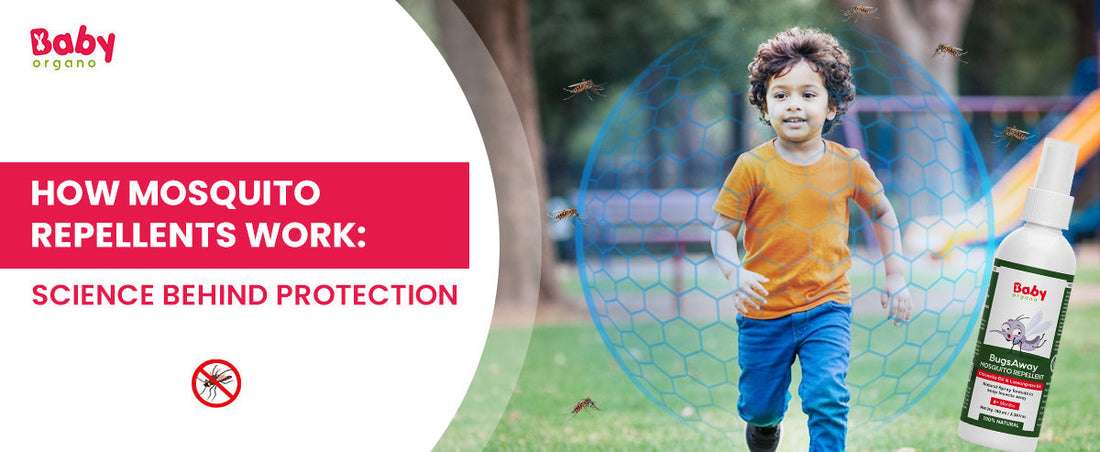
How Mosquito Repellents Work – The Science Behind Protection
- by Riddhi Sharma
- 2 min 23 sec
Table of Contents
We all know the buzz of a mosquito isn't just annoying; it can lead to serious illnesses.
As parents, protecting our kids from mosquito bites becomes second nature.
But have you ever wondered how mosquito repellents actually work?
Let’s break down the science behind mosquito repellents in the simplest way—parent to parent.
Why Mosquitoes Bite in the First Place
Mosquitoes are attracted to the carbon dioxide we exhale.
They also love the smell of sweat, body heat, and certain body chemicals.
This makes active, playful kids especially appealing to these tiny troublemakers.
What Does a Mosquito Repellent Do?
Repellents don’t kill mosquitoes.
Instead, they make your child “invisible” or unappealing to them.
They create a scent or chemical barrier that confuses or deters mosquitoes from coming close.
How Mosquito Repellents Mask Our Scent
Repellents work by blocking the mosquito’s scent receptors.
When we apply a repellent, mosquitoes can no longer detect our breath, body heat, or sweat effectively.
This keeps them from landing or biting.
Common Active Ingredients in Modern Repellents
You’ll find ingredients like DEET, picaridin, or IR3535 in many commercial repellents.
These are lab-made chemicals that offer long-lasting protection.
But they come with a few concerns—especially when used on small children.
DEET: Effective but With Caution
DEET is effective but can irritate sensitive skin.
It's not recommended for babies under 2 months.
Also, high concentrations aren’t ideal for kids—always check the label before using.
Picaridin: A Safer Alternative
Picaridin is less greasy and has a milder scent.
It’s considered safer and causes fewer skin reactions.
Still, it's synthetic and not something many of us feel great about applying daily to our little ones.
Natural Mosquito Repellents: A Safer Approach
This is where natural or Ayurvedic repellents come in.
They use plant-based oils and extracts to keep mosquitoes away.
They’re gentle on the skin and safer for children—even babies.
Essential Oils That Keep Mosquitoes Away
- Lemongrass
- Citronella
- Eucalyptus
- Neem
- Lavender
They have strong scents that mosquitoes hate. Plus, they smell pleasant and are completely safe for children when used properly.
How Natural Ingredients Work
Essential oils form a vapor barrier around the body.
This masks the natural body scents mosquitoes are attracted to.
So your child stays protected—without harsh chemicals or side effects.
Want to know which repellents are safest for kids? Check out our comparison guide:
Natural vs Chemical Mosquito Repellents: Which Is Safer for Kids?
Forms of Repellents: What to Choose
Repellents come as sprays, roll-ons, lotions, patches, and even mosquito-repelling clothes.
For kids, roll-ons and sprays with natural oils are usually the safest and easiest to use.
Why Spray Isn’t Always Best for Kids
Sprays can be accidentally inhaled or get into the eyes.
Roll-ons are safer as they can be applied only to clothes or specific spots on the body.
Always patch-test first.
Indoor Protection: Why It's Just as Important
We often think mosquitoes are an outdoor problem.
But indoor mosquitoes are equally dangerous—especially during monsoons.
Repellents help, but so do simple habits and natural tricks.
Safe Use of Repellents for Babies and Toddlers
Always choose age-appropriate repellents.
Never apply directly to babies' hands, eyes, or mouth areas.
Instead, dab a natural repellent on clothes or nearby bedding (if it’s safe to do so).
For complete guidance on choosing and using repellents for babies and toddlers, don’t miss our essential guide:
Mosquito Repellent: Your Complete 2025 Guide for Baby, Kids & Family Safety
When to Reapply
Most repellents, whether natural or synthetic, wear off after 4–8 hours.
Reapply as needed—especially after sweating, swimming, or bathing.
Check packaging instructions for safe usage limits.
Mosquito Nets Still Work Wonders
Repellents are effective—but don’t forget good old mosquito nets.
Covering cribs and beds at night is still one of the best preventive steps.
Especially for babies and toddlers.
Don’t Forget Window and Door Screens
Installing mesh screens on windows and doors keeps mosquitoes out.
This reduces the need for constant repellent use inside the house.
Natural safety always begins at home.
Is There a Risk of Resistance?
Yes. Some mosquitoes may become resistant to chemical repellents over time.
That’s why alternating between synthetic and natural repellents can be helpful.
And why natural solutions continue to gain popularity.
Mosquitoes Are More Than a Nuisance
Diseases like dengue, chikungunya, and malaria are spread by mosquitoes.
Repellents are your child's first line of defense—especially in high-risk areas or during rainy seasons.
Making Repellent a Routine
Just like you never forget sunscreen before a sunny day out…
Make mosquito repellent a part of your child’s routine.
Think of it as invisible armor!
Comparison Table: Chemical vs Natural Repellents
| Type | Key Ingredient | Safety for Kids | Effectiveness |
|---|---|---|---|
| Chemical | DEET, Picaridin | Moderate (age restrictions) | High |
| Natural | Lemongrass, Neem, Citronella | High (when used properly) | Medium–High |
Protect Your Child the Natural Way
Want a natural, safe option? Explore BabyOrgano’s Ayurvedic Mosquito Repellent Spray – trusted by thousands of Indian parents.
FAQs
1. Are natural repellents safe for babies?
Yes, if they’re made from child-safe essential oils and applied properly (on clothes or surroundings).
2. How often should I apply mosquito repellent on kids?
Every 4–8 hours, depending on sweat or water exposure. Always follow the product instructions.
3. Can I use mosquito repellent indoors?
Yes, especially natural ones. Combine it with nets and screens for best results.
4. Is it okay to apply mosquito repellent daily?
Natural repellents can be used daily. Avoid overusing chemical-based ones—alternate if needed.
Wrapping It Up
Mosquito repellents work by making our children "invisible" to mosquitoes.
Whether you go for natural or chemical-based options, the key is safe and consistent use.
Because prevention is always easier than cure.
- Tags:
- Parenting tips


